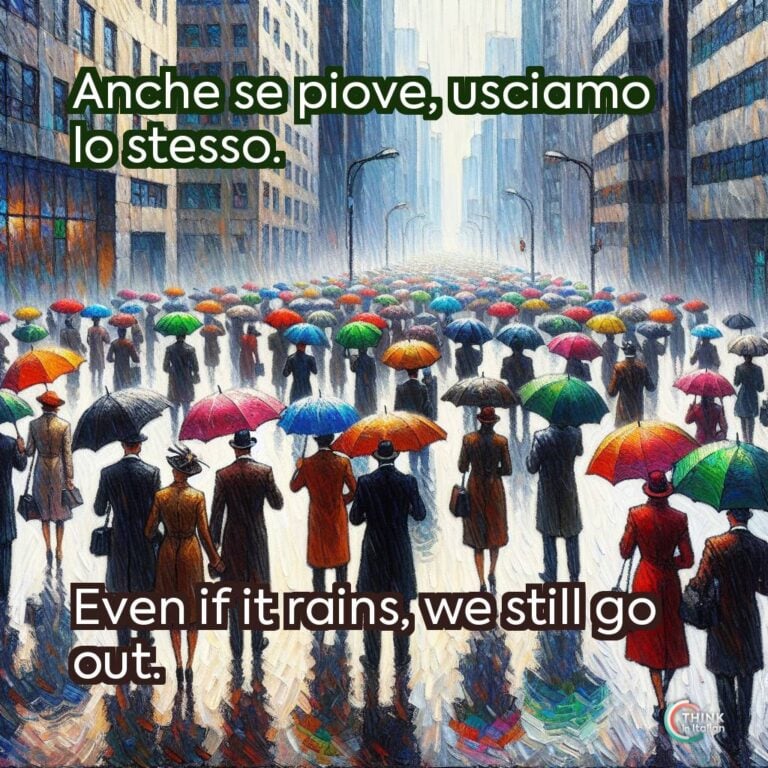“Anche” in Italian
Anche is an Italian conjunction. Specifically, in linguistics it is labeled as a coordinating conjunction, meaning that it is used to connect words or sentences that are logically equivalent.
As a linguist, I like to be very accurate when labeling grammar terms, so if you want a meticulous definition of “anche” then let me tell you it is a copulative coordinating conjunction.
Copulative conjunctions have the purpose of adding meanings to existing sentences. English examples of copulative conjunctions are “and”, “also”, and “moreover”.
Now that you know its linguistic classification, I am sure you already have an idea of its meaning. So, what does “anche” mean?
As easy as it is, “anche” means “also”.
Unlike English, which has “too” and “as well” as synonyms, “anche” in Italian is very easy and straightforward. We do have another word, “pure”, but it is less commonly used.
How to use “Anche” in Italian
Meaning of “Anche” in Italian
As I said before, “anche” in Italian is used to add meaning to an existing sentence, and it always conveys a positive addition.
It is usually used to add emphasis on inclusion to a statement, like in the sentence:
Alla festa viene anche Maria.
To the party, also Maria comes.
Where to put “Anche” in Italian: Placement in Sentences
Hai capito il significato di questa parola? Anche io! (Did you understand the meaning of this word? Me too!)
You might have noticed that “anche” is usually placed before the person, the action, or the object it’s referring to.
This is because, in linguistics, conjunctions are modifiers, and modifiers in Italian can be found both before and after the item they refer to.
Modifiers, like adjectives and adverbs, modify the item they relate to. If you have already read my article about Italian adjectives, then you know that Italian is pretty flexible in terms of modifier placement.
For me, it is very important to understand this matter, because the placement of “anche” can significantly alter the meaning of a sentence.
Depending on where you put it in a sentence, it emphasizes one or another term, like in the following examples:
Ho mangiato anche la pizza.
I ate also the pizza.
- Meaning that besides something else, I ate pizza, too. Here, the item that is being modified is pizza.
Ho anche mangiato la pizza.
I also ate pizza.
- Meaning that besides doing something else, I ate pizza. Here, instead, the modified item is the action of mangiare (to eat).
These sentences are almost the same, but by only moving “anche” we obtained different meanings.
Trust me, if you want to learn Italian fast, you must understand the subtleties of this amazing language and you will achieve fluency in no time!
Examples
Now that I have bored you enough with linguistics, let me give you some context. Here, I will list the most common Italian phrases where you can find the word “anche”.
Anche io voglio andare al cinema.
I want to go to the movies too.
Ho comprato il latte, e anche il pane.
I bought the milk, and also the bread.
Lei parla italiano, ma anche francese.
She speaks Italian, but also French.
Voglio anche una fetta di torta.
I want a slice of cake too.
Anche lui ha deciso di partire.
He has decided to leave too.
Ho mangiato la pizza, e anche le patatine.
I ate the pizza, and also the fries.
Anche mia madre vuole venire alla festa.
My mother wants to come to the party too.
Beyond “Anche”
Neanche (Neither)
As I said before, “anche” always positively adds pieces of information. If you want to agree on something that has been previously negated, instead, you need to use neanche.
In English, “neanche” can be translated as neither or not either. Also in this case, it is usually placed before the person, the action, or the object it’s referring to.
If it is being used with a verb, you don’t need to use the negative word non, as “neanche” itself already conveys a negation. However, if you put it after the verb, then you do need it.
Here are some examples:
Non posso venire stasera.
I cannot come tonight.
Neanch’io (posso venire).
Neither can I (come).
In this case, you could just say neanch’io (me neither) without repeating the whole phrase.
Non mi piace neanche questo film.
I don’t like this movie either.
Anche se (Even if)
“Anche se” is a powerful conjunction in Italian, which translates to “even if” or “although” in English and, just like in English, it introduces a condition that is in contrast with the main clause.
Whether it is used in casual conversation or formal writing, anche se allows speakers to express hypothetical scenarios, unexpected outcomes, or uncertainty.
Anche se ho imparato questo argomento, voglio continuare a fare lezione di Italiano!
Even if I learned this topic, I want to continue taking Italian Classes!




